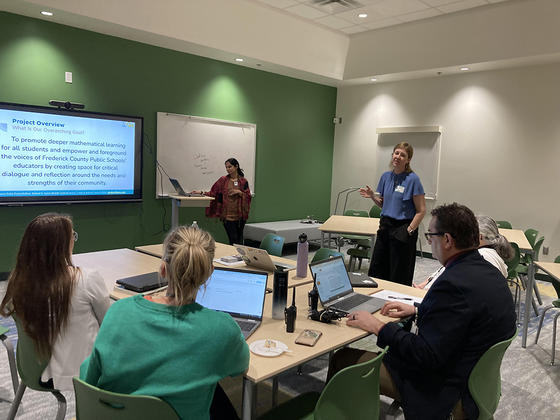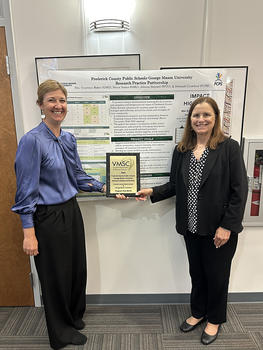Education is an ever-evolving field. With each new cohort of students, teachers must adapt to different learning preferences and needs. And at George Mason University, researchers are developing tools and techniques to support K-12 educators and improve student outcomes.
Associate Professor Courtney Baker, MEd Curriculum and Instruction ’08, PhD in Education with a mathematics education leadership concentration ’14, specializes in mathematics education and teacher development. Her current research, initially supported by a seed grant from the College of Education and Human Development, focuses on mathematics specialists in K-12 schools and how they can best support student learning.
“It’s hard to study what’s happening with math specialists because it’s a complex phenomenon,” Baker said. Not only do their roles vary greatly from school to school, person to person; they interact with and influence both teachers and students in unique ways. “You have to understand the ecosystem.”
For the past three years, Baker has worked with Frederick County Public Schools (FCPS) in Maryland to study the role of math specialists in middle school mathematics education. With four middle schools, FCPS offers a rich and diverse context for research, with math specialists bringing a wide range of experiences and fulfilling varied roles across the district.

There’s history there, too. Deb Crawford, MEd Education Leadership ’92, and PhD in Education with a mathematics education leadership concentration ’15, secondary mathematics coordinator for FCPS, was in the same PhD cohort as Baker and has worked with George Mason researchers on numerous other projects.
“When we first discussed the project in June 2022, our math scores weren’t where we wanted them to be,” said Crawford. “We saw this as an opportunity for growth.”
To conduct the study, Crawford and Baker recruited Divya Varier, George Mason associate professor of educational psychology and research methodology, and Johnna Bolyard, PhD Education ’06, associate director of the School of Education at West Virginia University. Varier is a mixed method researcher, using both qualitative and quantitative data to evaluate how educational programs work. Bolyard served as a consultant and collaborator on the project.
For this project, they utilized surveys and interviews with teachers, math specialists, and administrators in Frederick County’s four middle schools, as well as conducted frequent data reviews to discuss their findings.
“We want to be as close to the study context as possible,” said Varier. “In research practice partnerships, that's the expectation.”
“They are very embedded in the culture of the school division,” said Crawford.
In large systems like a school district, or even a school itself , multiple factors contribute to student outcomes. Understanding context, then, is necessary in order to shape the course of the research. After an investigative first year speaking with leadership, administrators, and teachers, the team decided to narrow their research to the assessment methods used to track student comprehension and progress through the curriculum: from exit tickets to quick in-the-moment knowledge checks that provide teachers with a better sense day-to-day, minute-to-minute of how students are learning.
And because of their findings, FCPS is making changes. They committed resources to hiring dedicated math specialists for each school after the data showed improvement in student outcomes as a result. Additionally, some assessment tools have been discontinued after the results showed that the tools were not providing teachers or students with what they needed. And the data compiled throughout this project has been used to update the schools’ Comprehensive School Improvement Plans.

"All of this goes toward helping students have rich, relevant, and rigorous mathematics experiences to help prepare them for the future,” said Baker.
As a testament to their dedicated and sustained work, the program was named a 2025 “Program That Works” by the Virginia Mathematics and Science Coalition. Their work is an example of how George Mason is transforming education to break barriers and to create inclusive and accessible learning opportunities for the workforce of the future, empowering communities worldwide.
“Ultimately, I want members of the school community to recognize their own agency and feel empowered to contribute to research-based, data-informed decisions,” said Baker. “My hope is that they see their ability to help shift the status quo in meaningful and positive ways.”
Related news
- July 11, 2025
- July 9, 2025
- July 1, 2025
- June 2, 2025
- May 29, 2025
